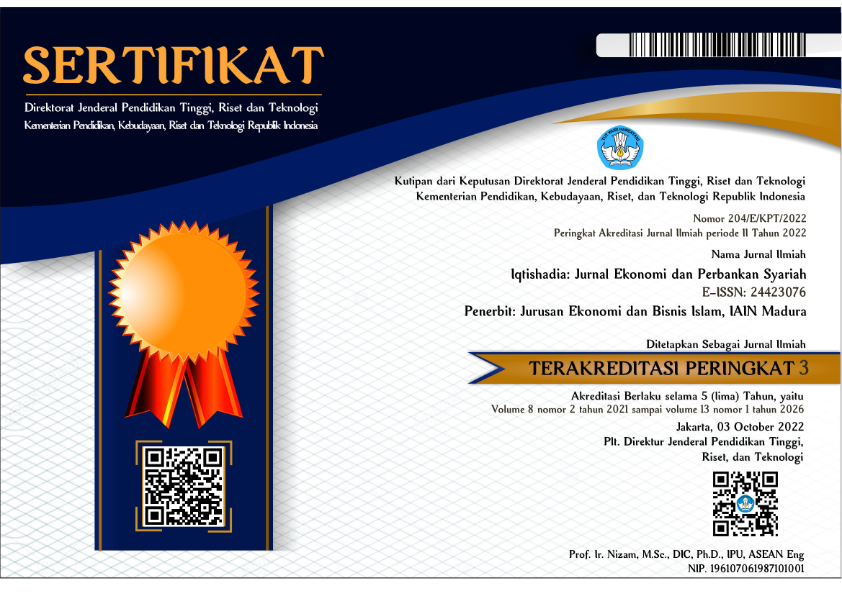Board Characteristic and Shari’a Banks Performance: Evidence from Indonesia and Malaysia 2015-2020
 Abstract views: 345
,
Abstract views: 345
,
 PDF downloads: 301
PDF downloads: 301
Abstract
This study aims to examine the effect of board characteristics on the performance of Islamic banks (IBs) in Indonesia and Malaysia in 2016-2020. The sample of this study includes 11 Islamic commercial banks in Indonesia and 7 Islamic commercial banks in Malaysia. The analysis method uses panel data regression which is processed with the help of software Eviews 12. Performance is measured by Return On Assets (ROA), Return On Equity (ROE), and Non-Performing Financing (NPF), Board characteristics are measured by the size of the board of directors, the proportion of directors women, the expertise of the board of directors, the size of the sharia supervisory board (DPS), the proportion of female DPS and the expertise of the DPS. The results of the study show that overall Islamic Corporate Governance and Corporate Governance have a positive effect on the performance of Islamic Banks (IBs).
Keywords: Kata kunci: Islamic Banks; Islamic Corporate Governance; Corporate Governance; Performance Islamic Bank
Downloads
References
Ben Abdallah, Mariem, dan Slah Bahloul. “Disclosure, Shariah Governance and Financial Performance in Islamic Banks.” Asian Journal of Economics and Banking 5, no. 3 (26 Oktober 2021): 234–54. https://doi.org/10.1108/AJEB-03-2021-0038.
Bezawada, Brahmaiah, dan Sager Reddy Adaelli. “CORPORATE GOVERNANCE, BOARD CHARACTERISTICS AND PERFORMANCE OF INDIAN BANKS: AN EMPIRICAL STUDY.” International Journal of Economics and Financial Issues 10, no. 3 (20 April 2020): 83–87. https://doi.org/10.32479/ijefi.9536.
Buallay, Amina. “Corporate Governance, Sharia’ah Governance and Performance: A Cross-Country Comparison in MENA Region.” International Journal of Islamic and Middle Eastern Finance and Management 12, no. 2 (30 April 2019): 216–35. https://doi.org/10.1108/IMEFM-07-2017-0172.
Darmadi, Salim. “Board diversity and firm performance: The Indonesian evidence.” Corporate ownership and control Journal 8 (2011).
Farida, Dessy Noor. “Pengaruh Diversitas Gender Terhadap Pengungkapan Sustainability Development Goals.” Jurnal Akuntansi Indonesia 8, no. 2 (2019): 89–107.
Hakimi, Abdelaziz, Houssem Rachdi, Rim Ben Selma Mokni, dan Houda Hssini. “Do Board Characteristics Affect Bank Performance? Evidence from the Bahrain Islamic Banks.” Journal of Islamic Accounting and Business Research 9, no. 2 (5 Maret 2018): 251–72. https://doi.org/10.1108/JIABR-06-2015-0029.
Hidayat, Dicky Permana, dan Erman Denny Arfianto. “ANALISIS PENGARUH GOOD CORPORATE GOVERNANCE (GCG), PRINSIP PEMBIAYAAN, DAN TUJUAN PENGGUNAAN PEMBIAYAAN TERHADAP PEMBIAYAAN BERMASALAH PERBANKAN SYARIAH DI INDONESIA,” t.t., 14.
Hyun, Eunjung, Daegyu Yang, Hojin Jung, dan Kihoon Hong. “Women on boards and corporate social responsibility.” Sustainability 8, no. 4 (2016): 300.
Jao, Robert, Fransiskus Randa, Anthony Holly, dan Leonardo Gohari. “PENGARUH KARAKTERISTIK DEWAN DIREKSI TERHADAP nnKINERJA KEUANGAN PERUSAHAAN NON KEUANGAN YANG TERDAFTAR DI BURSA EFEK INDONESIA” 18 (2021): 12.
Khalil, Afef, dan Neila Boulila Taktak. “The Impact of the Shariah Board’s Characteristics on the Financial Soundness of Islamic Banks.” Journal of Islamic Accounting and Business Research 11, no. 9 (29 Juli 2020): 1807–25. https://doi.org/10.1108/JIABR-08-2018-0127.
Khan, Imran, dan Syeda Nitasha Zahid. “The Impact of Shari’ah and Corporate Governance on Islamic Banks Performance: Evidence from Asia.” International Journal of Islamic and Middle Eastern Finance and Management 13, no. 3 (19 Juni 2020): 483–501. https://doi.org/10.1108/IMEFM-01-2019-0003.
Kılıç, Merve, dan Cemil Kuzey. “The effect of board gender diversity on firm performance: evidence from Turkey.” Gender in management: An international journal, 2016.
Mohammed, Halima Dahiru. “Corporate Governance and Financial Performance of Quoted Companies in Nigeria.” European Journal of Business and Management 12, no. 6 (28 Februari 2020): 31–40.
Mohd, Ghazali Nazli Anum. “Governance and ownership in Malaysia: their impacts on corporate performance.” Asian Journal of Accounting Research 5, no. 2 (1 Januari 2020): 285–98. https://doi.org/10.1108/AJAR-03-2020-0017.
Nomran, Naji Mansour, dan Razali Haron. “Shari’ah Supervisory Board’s Size Impact on Performance in the Islamic Banking Industry: An Empirical Investigation of the Optimal Board Size across Jurisdictions.” Journal of Islamic Accounting and Business Research 11, no. 1 (6 Januari 2020): 110–29. https://doi.org/10.1108/JIABR-05-2017-0070.
Nugraheni, Peni, dan Rifqi Muhammad. “Board of directors and credit risk: An empirical study of Indonesian Islamic banks.” Jurnal Keuangan dan Perbankan 23, no. 4 (2019): 503–13.
Pradnyana, I. Putu Rai, I. Gede Cahyadi Putra, dan Made Edy Septian Santosa. “PENGARUH GOOD CORPORATE GOVERNANCE DAN UKURAN PERUSAHAAN TERHADAP KINERJA KEUANGAN PERUSAHAAN PERBANKAN YANG TERDAFTAR DI BURSA EFEK INDONESIA.” Kumpulan Hasil Riset Mahasiswa Akuntansi (KHARISMA) 3, no. 2 (2021): 331–40.
Smaoui, Houcem, Ines Ben Salah, dan Boubacar Diallo. “The Determinants of Capital Ratios in Islamic Banking.” The Quarterly Review of Economics and Finance 77 (Agustus 2020): 186–94. https://doi.org/10.1016/j.qref.2019.11.002.
Teg-Teg, I. “Anlisis Gender Deversity Dan Remunerasi Direksi Terhadap Kinerja Perusahaan.” PhD Thesis, Universitas Mercu Buana, 2013.
Vu, Manh-Chien, Thanh Tu Phan, dan Nhu Tuyen Le. “Relationship between Board Ownership Structure and Firm Financial Performance in Transitional Economy: The Case of Vietnam.” Research in International Business and Finance 45 (Oktober 2018): 512–28. https://doi.org/10.1016/j.ribaf.2017.09.002.
The journal operates an Open Access policy under a Creative Commons Non-Commercial Share-Alike license. All articles published Open Access will be immediately and permanently free for everyone to read and download.
• Creative Commons Attribution-NonCommercial (CC-BY-NC)

Iqtishadia: Jurnal Ekonomi dan Perbankan Syariah by http://ejournal.iainmadura.ac.id/index.php/iqtishadia is licensed under a Creative Commons Attribution-NonCommercial 4.0 International License.
Based on a work at http://ejournal.iainmadura.ac.id.


























